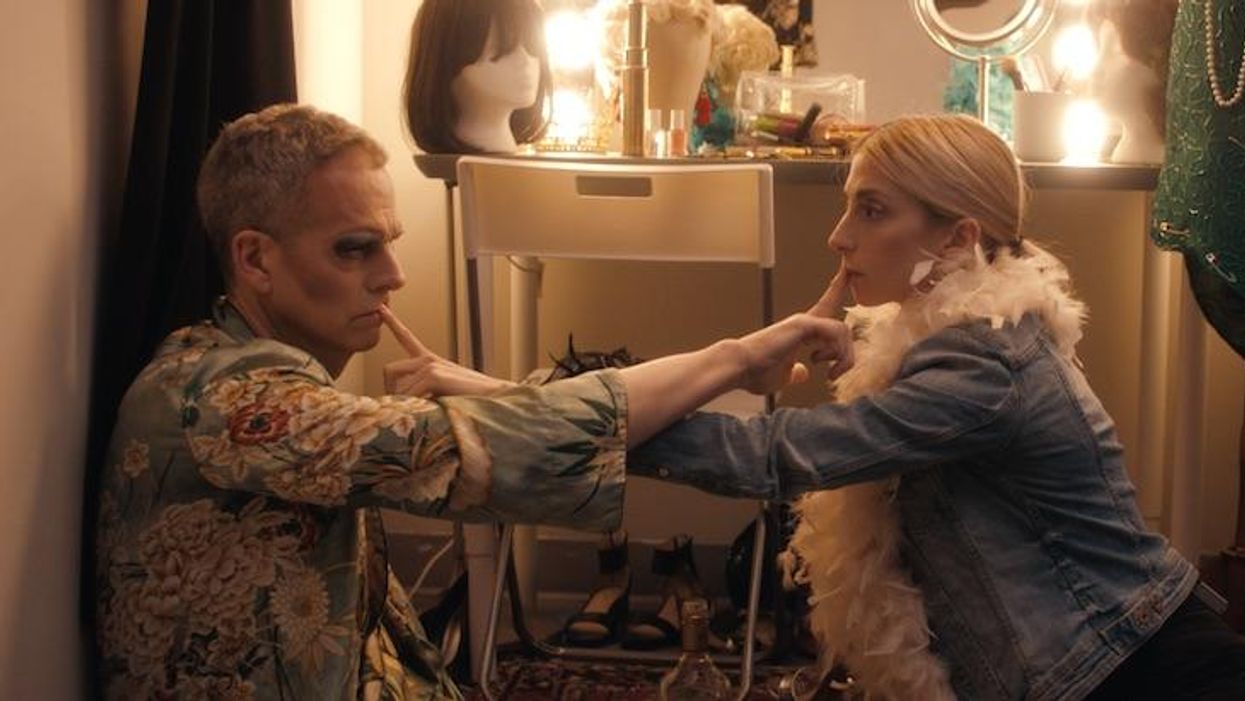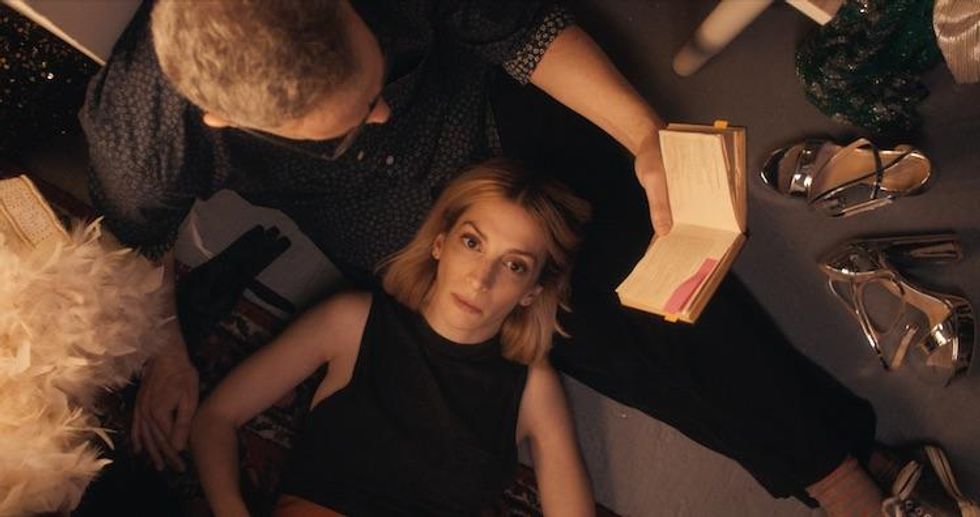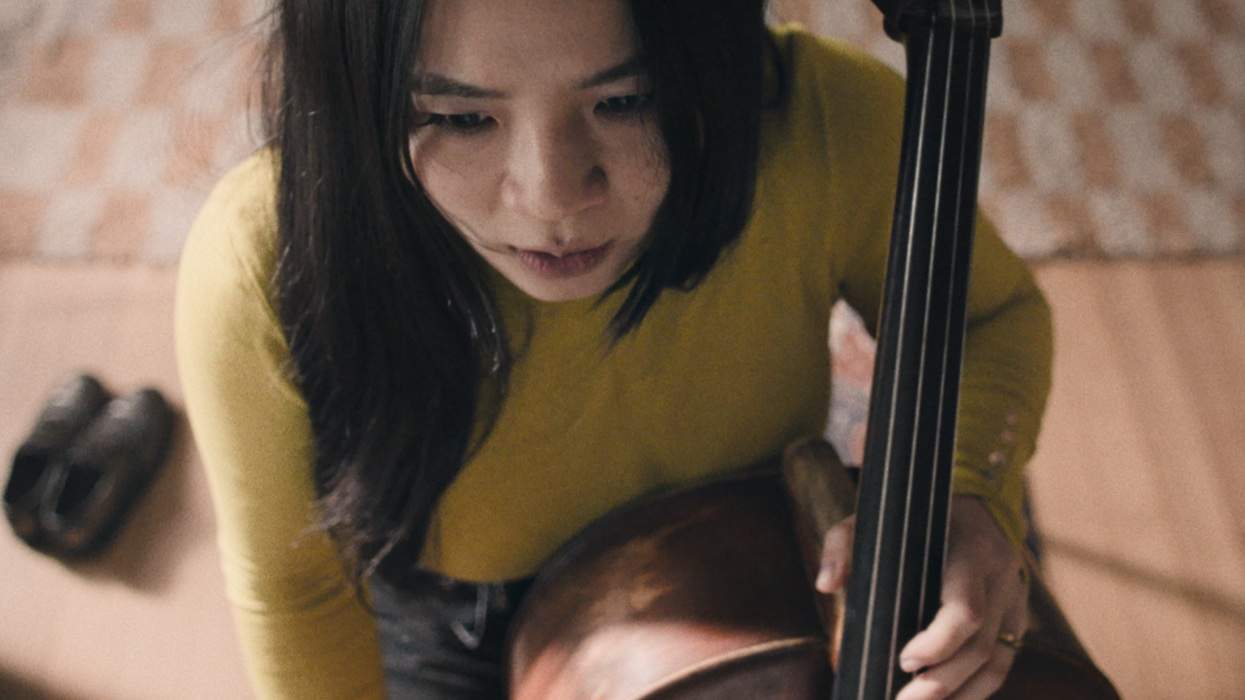Not long after offering to be a surrogate for a single 50-something gay man, the protagonist in the film Milkwater makes so many cringeworthy decisions that viewers may consider peering through fingers as if screening a horror movie. Milkwater touches on some scary, yet relatable, behavior, but that is part of the charm of this romantic comedy about platonic love and chosen family.
For Molly Bernard, best known for the quirky, sex-positive pansexual character of Lauren on Younger, there's a certain freedom to playing Milkwater's Milo, a messy 26-year-old straight woman who despite some egregious missteps, is lovingly held up by the queer people in her life. Those people include the father of the child she's carrying, Roger (Patrick Breen), her roomie George (Robin de Jesus), and her best friend Noor (Ava Eisenson). That Bernard is queer and well-acquainted with the impact of logical or chosen families adds an important layer to her portrayal.
"Milo is trying to find a way out of her own isolation," she says of her character, who lost both of her parents at a young age. "When you're as traumatized and hurting as she is. You're looking for those ways out."
"I also love that the most stable people around her are her queer friends," Bernard tells The Advocate. "It just flips it on the classic queer stories."
From writer and director Morgan Ingari, Milkwater begins with a baby shower for Milo and George's queer best friend Noor and her partner. Unable to get into the spirit of sniff-the-diaper shower games, Milo and George retreat to a gay bar where Milo hits it off with Roger, a bar owner and drag performer who feels the clock ticking in terms of having a child. After a short friendship, Milo, a wayward musician who works in a guitar shop, offers to carry Roger's baby to the chagrin of her friends who find her sudden act of munificence questionably out of character. Milo and Roger form a platonic love that works for a while until he enters a romantic relationship with someone from his queer dads' group. He draws boundaries with Milo, who in feeling brushed aside, lowkey stalks him for companionship as he works to maintain a separation between them.
"Isn't it funny that the queers are like the normies? This is one of my favorite little subtleties of the movie," Bernard says.
A Brooklyn native who cut her teeth earning an MFA at the prestigious Yale School of Drama, Bernard was immediately drawn to Milo, who is in many ways is the opposite of Younger's Lauren. Where Lauren is self-assured and career-driven, Milo flails.
"She is messy and not immediately likable, she's struggling, she's lost, and she's needy. It's all these things, and I related to every single one of them," Bernard says. "I was a big mess for most of my 20s. And I've kind of just come out of that maelstrom."
Even for Bernard, who sat with Milkwater's themes while shooting and since its release, the film stealthily eludes easy categorization. Milo meets a nice guy musician, Cameron (Ade Otukoya), and dates him. But the real love story is with her friends and Roger. In an early scene, she and Roger open up to one another while he's in a state of being half in and half out of dress for his drag alter ego, Angela Merkin. And it's intimate in its way. In another more overtly intimate scene, they read the Anne Sexton poem "The Consecrating Mother" (the inspiration for the film's title) together to the baby in the womb.
"There were moments on set where I remember thinking, Oh, this movie is a rom-com, but obviously not. But it is kind of a rom-com between Milo and Roger. And then there's the romance with Cameron," Bernard says. "Then there's also, it turns out, it's a coming of age story in it's in a way, and it's not. What it is not, is confused. Like, the script is not confused about what story it's telling. It's just telling it in a non-formulaic way. Not the traditional way that we know."
There's a reason so many LGBTQ-themed films and TV shows (It's a Sin, Pose, Tales of the City, and even Younger to name a few) tell the stories of how queer people build family units outside of biological ties. But Milkwater takes it a step further as Milo, who's not LGBTQ+, is taken in and looked after by her queer family no matter how badly she fumbles. In one scene, Noor, an attorney, expresses concern over the terms of the surrogate contract Roger has drawn up. At another point, although George has had it with Milo's erratic behavior when she's reeling from Roger's attempts to distance himself from her, it's clear he'll still show up for her. The family dynamic Ingari creates is personal and resonant for Bernard.
"I myself am from a queer chosen family. I'm estranged from my biological mother. And I have these two moms in my life, and they are my universe, they're my people. And they are not biological parents. And yet, they are my parents, you know," Bernard shares. "That is something that's so important to me, and most of my friends. They're my chosen family.
"That aspect of the script was a no-brainer for me. We need more films like this that depict family showing up for each other," she adds. "The word family has nothing to do with biology as far as I'm concerned. So that part of the film is very powerful. I hope it's one of the beautiful things that people are left with -- that feeling of Wow, family can look very different."
Milkwater is available on VOD now and will be available on Netflix as of July 18.

















